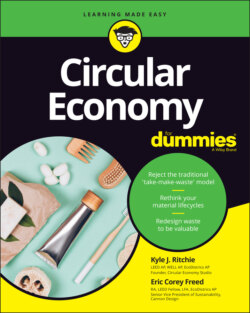Читать книгу Circular Economy For Dummies - Eric Corey Freed - Страница 42
Everyone keeps having kids
ОглавлениеThough the resources on the planet are finite and limited, the population keeps increasing, which is driving demand for more and more stuff. As a result, there’s a direct link between population growth and the size of our human impact on the environment.
As you have more children, you increase your environmental footprint (your impact) in terms of the waste produced, food consumed, energy required, and carbon emissions released. It makes sense: more people, more stuff needed.
In a study from Oregon State University, they found that not having an extra child in your family is the most effective thing you can do to reduce your environmental footprint. This choice was 20 times more impactful than any other green action you take in your life, including becoming a vegan or driving an electric car or using solar power in your home. (See Figure 2-2.)
FIGURE 2-2: Having one fewer child, which saves 65 tons of carbon emissions per year, is the greenest thing you can do, compared with other lifestyle choices.
Now, don't start telling your neighbors that “those mean authors” are telling you to not have kids — that's not it at all. Kids are wonderful. In fact, we were kids once, too. If you want to have kids, please do. The point is that as long as humans continue to rely on the linear economic system of take-make-waste, every additional person brought into the world will increase the amount of waste and carbon emissions generated. (See Figure 2-3.) A linear economy cannot scale with population.
Source: The United Nations
FIGURE 2-3: If you compare population growth to carbon emissions, you see a direct correlation.
Despite all that bad news, another 225,000 new people joined us on Earth today. (That’s more than 150 people per minute!) Each of our new neighbors will only increase demand and strain on our linear economic system. Simply not having any more children isn’t really an option here, so we have to change the economic system from linear to circular.
